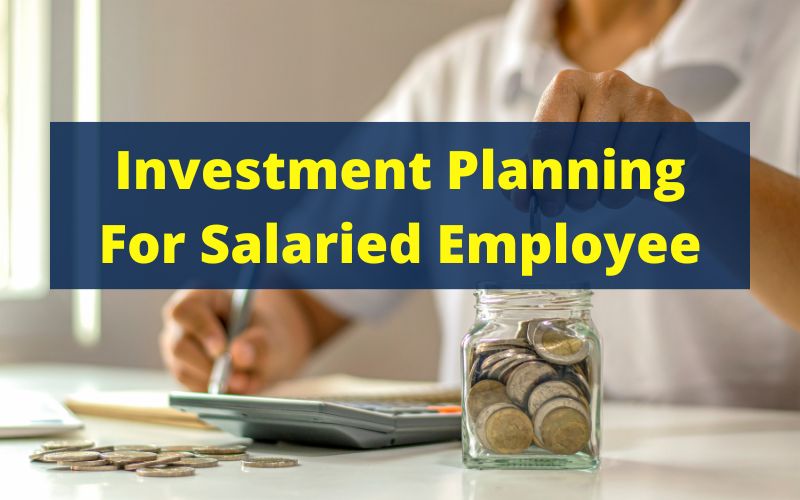Salaried employees face several challenges in personal finance, not limited to investment planning but budgeting, debt planning, tax planning, retirement planning, etc. In this article, I have focused on the organized aspect of investment planning for salaried employees that can take your personal finance to the next level.

Table of Contents
2 Common Challenges That Salaried Individuals Face In Investing
1) Not sure if they are investing in the right products
2) If their investments are sufficient
However, as per my experience, challenges are more profound. Individual investors may or may not be investing in the right financial products and need to know whether the investment is sufficient. A simple financial planning process can help them get clarity where one first understands their goals and invests accordingly.
Financial planning gives a crystal clear idea of how much to invest and which financial product will suit their goal so that they can achieve their goal on time rather than just picking any financial instrument to invest without understanding if they can help them achieve their goal.
What Must a Financial Planning Include?
Often, salaried employees need help with investment planning due to not giving importance to making a strong financial foundation, directly jumping to invest without understanding the products, and buying things on EMI. These are the root cause of all financial issues.
If I have to answer “what must financial planning include” in layman’s language, then I must break it into two parts:
a) First, prioritize to make your financial foundation strong.
b) Secondary, focus on goal-based investing.
Practical Tips for Financial / Investment Planning for Salaried Employees
For Strong Financial Foundation:
Investing in wealth creation always looks attractive. However, to make your wealth creation long-term investing fail-proof, it is essential to work on a financial foundation so that your long-term investing always remains intact and you do not end up using it for unplanned needs. And that’s where a robust financial foundation plays a crucial role, for which you must cover your life and health for any uncertainty, including being ready for any emergency.
Most people think uncertainty will never come to me, but the unique feature of uncertainty is that it always gives surprises. That’s why it is your moral responsibility towards your family to work around the two crucial ingredients of a strong financial foundation first:
1) Insurance Planning:
Insurance planning is a must to protect your family.
a) Life cover: A life cover is a must if you are a family’s bread earner. Buy the life cover exactly how much you need rather than just a random cover like one crore.
💡Pro Tip: Alway buy a term cover that is pure insurance. Refrain from mixing insurance and investment because that neither gives you a good return nor good cover.
b) Health cover: Health cover is a must to avoid draining your savings. Many people lose all their savings due to unexpected medical expenses.
💡Pro Tip-1: Consider buying a combination of base and super-top-up policy combination to cover yourself more with less cost.
💡Pro Tip-2: Buying group cover is always cheaper. If your parents do not have health coverage, you must include them in your company coverage; this will help you cover them at a more affordable premium.
2) Emergency Fund Planning
Emergency fund planning is a must as emergencies always give surprises, and we must always be ready for it. For salaried employees, it is suggested to be prepared with a minimum of 3-6 months of expenses. Creating six months of expenses is an ideal emergency corpus. Always remember that the emergency fund’s first priority is liquidity, not return. Hence, park your emergency fund in such a way that it can be accessed easily when needed, and once utilized, it should be refilled to make yourself ready for the next emergency.
3) Clearing Expensive Debts
Having debt is quite normal in India, especially when buying a home. However, a house purchase without a loan is possible if you start investing early and plan it well.
Consider closing your expensive loan if you have multiple loans like a credit card, car, personal, home, etc.
It’s time for salaried working professionals to understand replacing EMI with mutual fund SIP can do wonders. It is essential to work in the mindset of being comfortable with loan EMIs.
💡Pro tip-1: Your total loan percentage should be at most 35% of your take home.
For Goal-based Investing
To begin with, you must divide your financial goals into short-term, medium-term, and long-term.
Short-term: Any goal with less than three years will come under short-term goals. When you plan your investing for short-term goals, you can choose safe products like RD, FD, and Debt mutual funds.
Medium-term: Any goal with 3-5 years will come under medium-term goals. For this goal, you can invest in a hybrid financial product that is on the conservative side, like a hybrid mutual fund.
Long Term: Any goal over five years will come under long-term goals. You can invest in risky financial products like equity mutual funds and direct shares for this goal.
📝Note: Apart from the tenure of the goal, your risk appetite plays an essential role in choosing where to invest. It is suggested to only invest in a risky asset if you understand your risk appetite.

5 Best Investment Options for Salaried Person
(1) Direct Equity (Stocks)
Direct equity investing is an excellent way for investors to get involved in the Indian market. However, avoiding investing in equity is suggested if you are starting your investing journey, looking for a quick return, and do not understand the market. Consider investing in equity via mutual funds, where an expert manages your hard-earned money.
(2) Mutual Funds (Systematic Investment Plan and Lumpsum)
Several mutual fund types are available in India, each with unique investment strategies and risk-return profiles. Based on the SEBI circular, the mutual fund has been broadly categorized into five groups: (a) Equity Schemes, (b) Debt Schemes, (c) Hybrid Schemes, (d) Solution Oriented Schemes, and (e) Other Schemes.
| Category | Scheme |
| Equity | Large-cap, mid-cap, Flexi-Cap, ELSS, etc |
| Debt | Liquid Fund, Short term debt fund, etc |
| Hybrid | Hybrid fund, Arbitrage Fund, etc |
| Solution Oriented Schemes | Retirement fund, Child fund, etc |
| Other Schemes | ETFs, Index Funds, Funds of Funds, etc |
Here are the ways to invest in Mutual Funds:
a) SIP (Systematic investment plan):
A mutual fund Systematic investment plan can help you systematically plan your investments. Once you have clarity in your goals and know your risk appetite, you can pick an ideal fund for your goal. If you are unsure, consider taking the help of a SERI Registered Investment Adviser who will help you with unbiased financial planning.
b) One-time investment:
Consider investing your bonus or any accumulated amount once a quarter. This will boost your wealth creation process. To get started with mutual fund investing, one must be KYC-compliant. Learn how to do KYC online with the click of a few buttons without investing.
💡Pro tip: While planning your investments, consider tax planning so that you can take care of your tax savings and meet your goals with one investment. Employee Provident Fund (EPF) one of the safest options for all working professionals is EPF, where not just an employee contributes but also the employer. The employee contribution is eligible for take benefits under section 80C.
💡Pro Tip: Never withdraw EPF; this will become the backbone of your retirement plan.
(3) Popular Post Office Savings Scheme
a) Public Provident Fund (PPF)
PPF is a long-term savings scheme with a tenure of 15 years, which can be extended in blocks of 5 years. It offers tax benefits and competitive interest rates. Deposits made in a PPF account are also eligible for deductions under Section 80C of the Income Tax Act.
b) Sukanya Samriddhi Yojana (SSY)
SSY is a government-backed savings scheme to benefit the girl children. Parents or legal guardians can open an account in the name of a girl child and contribute until she reaches 21. Here is the detailed article on Sukanya Samriddhi Yojana.
(4) Gold Investment
Gold is also known as yellow metal—we Indians love investing in gold in the form of jewelry. However, in terms of investing, it is advisable to opt for paper-form gold, that is, gold bonds and ETFs, which do not include any making charges, as well as a physical storage place, unlike jewelry. You can consider including 5-7% of gold in your portfolio. Gold will help you balance your portfolio.
(5) Real Estate Investment
Real estate always looks attractive to Indias. However, in today’s scenario, it’s better not to overweight your portfolio with real estate due to liquidity issues. Consider including 10-15% (excluding personal home for stay) of real estate in your portfolio.
Conclusion
In today’s world, personalization is the most important if you are looking for financial peace of mind. Just investing in any financial product is not going to solve the problem. You must make a strong financial foundation followed by goal-based investing for wealth creation.
Frequently Asked Questions
Q-1: Is there any rule for investing in equity?
As per the rule of thumb, the equity portion should equal your 100- your age. However, it has to be based on your risk appetite.
Q-2: How much must one invest in insurance?
Investing in insurance is highly not suggested. Never mix your insurance and investment, as it will neither cover your well nor give you good returns.
Q-3: Why should salaried employees prioritize investment planning?
Investment planning empowers salaried individuals to make their money work for them, providing financial security, growth opportunities, and a path to achieving their short and long-term financial goals.
Q-4: What strategies can salaried professionals employ for tax-efficient investment planning?
Employ tax-saving investment instruments like Equity-Linked Savings Schemes (ELSS), Public Provident Fund (PPF), and National Pension System (NPS) to minimize tax liabilities while maximizing returns.
Q-5: How can a salaried person navigate investment planning during uncertainties?
Uncertainties always give surprises. Salaried individuals must always be ready with emergency funds to take such uncertainty. Financial Planning should guide your decisions.
Q-6: Is there a recommended approach for salaried professionals to adapt their investment plans as they progress in their careers?
Adjust investment strategies to align with evolving financial goals, risk tolerance, and income levels as career stages change. Regularly review goals to stay on track.
Q-7: What Must a Personal Financial Planning Include?
All the elements falling under the financial foundation are essential – Life insurance, health insurance, Critical illness insurance, and emergency funding.
Q-8: Why is understanding your financial situation crucial before investing as a salaried person?
There are multiple investment options for a salaried person that might be confusing. By understanding your financial situation, you can invest in what is best for you and avoid random investment.
Q-9: Is a fixed deposit not a good investment option?
If your fixed deposit return in hand is able to beat inflation, then you may consider them for short-term goals and emergency funds. It also depends upon which tax break you fall. Higher returns come with higher risk; investing in a fixed deposit can give your principal financial security. An investment portfolio must always contain debt (FD, PPF, RD, etc) to keep it a balanced portfolio.








